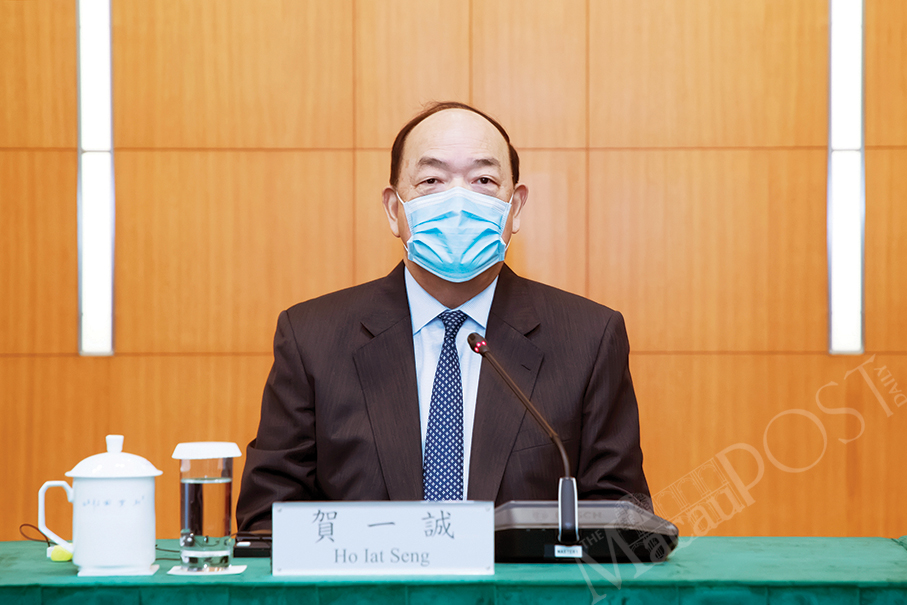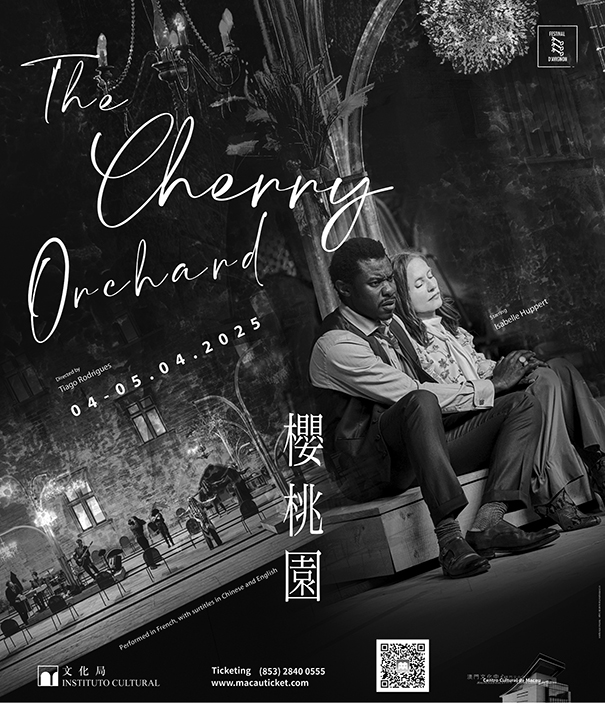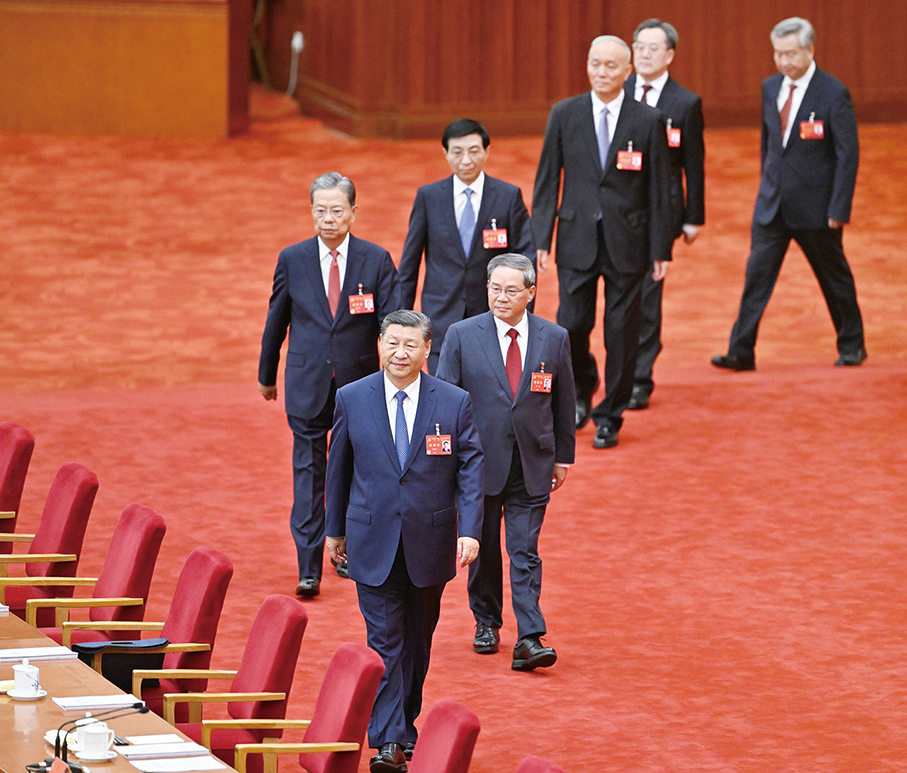Chief Executive Ho Iat Seng said yesterday that only after Macau reaches a COVID-19 vaccination rate of at least 80 percent could the local government discuss with the mainland authorities the possible further relaxation of travel restrictions for mainlanders to visit Macau.
Ho convened a special press conference yesterday at Government Headquarters about the local government’s latest response to the current wave of the COVID-19 epidemic which started on Saturday with a quarantine hotel security staff Delta variant cluster involving six novel coronavirus patients.
The first two Nepali security guards working at the Golden Crown China Hotel were confirmed as COVID-19 patients on Saturday, while the other four were diagnosed with the novel coronavirus disease on Tuesday – three fellow Nepali citizens working as security guards at the Golden Crown China Hotel and a mainlander working in the security control room of the adjacent Treasure Hotel. Both hotels are government-designated COVID-19 medical observation quarantine hotels. The two hotels in front of the local airport in Taipa are connected.
The Health Bureau (SSM) has said that the first two Nepali patients posed a potential COVID-19 community transmission risk as they had returned to their respective homes on the peninsula before they were diagnosed with COVID-19 on Saturday, while the other four patients posed a lower COVID-19 risk to the community as they had already been taken into quarantine before they tested positive for the novel coronavirus on Tuesday. All the six COVID-19 cases have been classified as “connected to an imported case” – a local resident from Turkey who was diagnosed with the disease on Friday. All of them have been infected with the Delta variant.

Chief Executive Ho Iat Seng addresses yesterday’s special press conference at Government Headquarters about the city’s latest response to the current COVID-19 wave. Photo: GCS
CE expects lifting of Zhuhai’s quarantine for Macau arrivals
Meanwhile, Ho also said that he expected the tightened border measures for those arriving in Zhuhai from Macau to be lifted tomorrow – National Day – if “nothing new about COVID-19” occurs in Macau before that.
Normally – i.e., before Macau’s current COVID-19 wave, the negative COVID-19 nucleic acid test (NAT) result for those travelling between Macau and Zhuhai without having to undergo quarantine was valid for seven days. In the wake of Macau’s confirmation of the first two Nepali patients in the early hours of Saturday, the Zhuhai health authorities tightened border measures for arrivals from Macau. Between 6 a.m. on Saturday and 5:59 p.m. on Sunday, the validity of all those arriving in Zhuhai from Macau was tightened to just 24 hours. Since 6 a.m. on Sunday, people entering Zhuhai from Macau must undergo 14 days of mandatory quarantine, except certain groups of people such as cross-border lorry drivers. The mandatory quarantine rule for arrivals from Macau, which was originally slated to have ended at 11:59 p.m. on Tuesday, has meanwhile been extended for another 48 hours, because of which it is now slated to end at 11:59 p.m. today.
Ho noted that the Zhuhai authorities have strengthened their COVID-19 prevention measures due to the ongoing Airshow China 2021 in the adjacent city – which is scheduled to end on Sunday. Ho said that “if luckily nothing new occurs in Macau”, he hoped that Zhuhai would lift the current tightened border measures for arrivals from Macau tomorrow, which he said would enable local residents and non-resident workers living in Zhuhai to return to their normal commutes between the two cities. However, Ho was quick to add that the possible lifting of Zhuhai’s toughened border measures was expected to be unable to boost Macau’s economy during the mainland’s National Day Golden Week which starts tomorrow.
Delta variant has shorter incubation period
Ho insisted that Macau’s COVID-19 situation could be regarded as having stabilised if no new COVID-19 cases are detected over the next few days, as the Delta variant, he noted, has a shorter incubation period than the original novel coronavirus. Ho added that those infected with the Delta variant normally come down with COVID-19 symptoms within five days of catching the novel coronavirus.
According to Ho, the Macau government will hold a video conference today with its Zhuhai counterpart about the possible partial or full lifting of Zhuhai’s tightened border measures for arrivals from Macau. Ho said that if the Zhuhai government agrees to partially or fully lift its border measures tomorrow during today’s meeting, the Macau government could be expected to successfully ask its Zhuhai counterpart to lift the 14-day mandatory quarantine for arrivals from Macau first, before the border measures could be further relaxed in the near future.
The whole mainland lifted its quarantine requirement for arrivals from Macau, which confirmed its first COVID-19 case on January 22 last year, in August last year. Since then, those travelling between Macau and the mainland do not need to undergo quarantine but need present an NAT certificate with a negative COVID-19 result valid for seven days. The issuing of Individual Visit Scheme (IVS) travel permits for all mainlanders to travel to Macau resumed in September last year. However, despite the resumption of the issuing of IVS travel permits, mainlanders wishing to visit Macau have still been subject to certain restrictions, such as the fact that the mainland authorities have still not resumed the electronic application process for a travel visa to Macau.
Macau has lowest jab rate in ‘whole China’
During yesterday’s press conference – which was also attended by Secretary for Security Wong Sio Chak and Secretary for Social Affairs and Culture Elsie Ao Ieong U, Ho said that Macau’s COVID-19 vaccination rate has only reached around 51 percent so far, which, according to Ho, is the lowest among all regions in “the whole of China”. The chief executive again urged residents to be inoculated against COVID-19 in order to help Macau achieve herd immunity.
Ho said that despite the fact that those who have been inoculated against COVID-19 could still be infected with the novel coronavirus, they normally would not suffer a serious condition. “At least they are unlikely to be admitted to the intensive care unit,” Ho said.
Ho said that ideally the best scenario is that everyone is vaccinated against the novel coronavirus. After considering that certain groups of people are unable to get vaccinated, such as those whose age is not covered by the vaccination programme (those aged below 12) and those having certain health reasons or are pregnant, Ho pointed out, Macau’s COVID-19 vaccination rate should reach at least 80 percent.
Electronic applications, tour groups
Ho also said that without a high COVID-19 vaccination rate, Macau would not have any confidence to ask the central government to relax the current restrictions for mainlanders to visit Macau, such as the resumption of the electronic application process for mainlanders to obtain a travel visa to Macau, and the resumption of the permission to organise tour groups to Macau.
Without the resumption of the electronic application process for a travel visa to Macau, mainlanders have to go to police service points in their respective cities in person to file an application for a travel visa to Macau. With the electronic application process in place, which was implemented before the COVID-19 pandemic, mainlanders were able to apply for a travel visa to Macau in more convenient ways such as making their applications at self-service kiosks.
Ho said that the still low COVID-19 vaccination rate in Macau “makes it difficult for the Macau government to ask the central government to ease its restrictions for tour groups to visit Macau”.
The chief executive said that without tourists visiting Macau, it would be almost impossible for the city to sustain its economic recovery process.
“Without a high vaccination rate, it is difficult for the Macau government to be emboldened to ask the central government for the resumption of the electronic application process for a travel visa to Macau and the resumption of tour groups to Macau,” Ho said.
Ho also said that he was “embarrassed” whenever he was asked by mainland officials about Macau’s latest COVID-19 inoculation rate.
Ho also said that one could not blame the six hotel security staff – all of them non-resident workers - who came down with COVID-19. He added that, anyhow, he doubted that any local was ready to work as a hotel security guard in a hotel used for medical observation quarantine. He also said that if people were keen to blame anyone for what happened, he would “take the biggest blame.”







